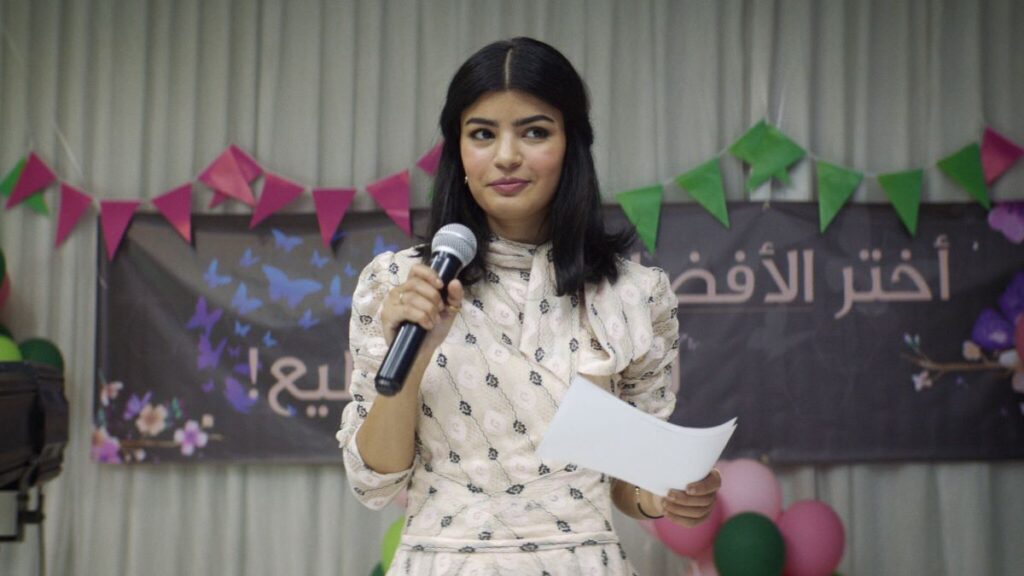Haifaa al-Mansour is one of the most significant figures in cinema in Saudi Arabia. She is praised and vilified for her films which encourage discussion on taboo topics such as tolerance, orthodoxy, and the Kingdom’s restrictive culture. In 2017, women in Saudi Arabia were finally given the right to drive. It’s no wonder that this is how al-Mansour decided to open her film, with Dr. Maryam Alasfan (Mila Alzahrani) driving in her car to the hospital she works at.
While some things are progressing in the Kingdom, there is still some resistance. We see this when one of the first patients Maryam receives outright refuses her treatment, demands a male doctor and protests when she looks at him or goes to touch him. This is further compounded by her male colleagues who disregard her suggestions and input, and some who recoil at her forwardness and ambition. The hospital she works at is in disarray and the road to get to it is in disrepair and no one seems interested in fixing it.
Maryam wants to go to Dubai for a conference where she can apply for a job at a better hospital. Unfortunately, her travel plans are delayed when she learns her passport has expired, and only a signature from her father could get her to travel. In an attempt to get her passport renewed, she ends up receiving an application for the local municipal council. She decides to run, promising to fix the road that leads to the hospital. From there, we witness Maryam’s pursuit of political office against all odds. The men refuse to listen to her, many of the women are still too afraid to participate in politics, even her own younger sister chastises her for pursuing a path that will lead to nothing but gossip and ridicule.
Still, undeterred and armed with a photographer older sister, a surefire 10-step program for how to run a political campaign, and inspired by an awful American campaign ad, Maryam sets her sights on breaking through a new barrier for women in the Kingdom. But the film isn’t so much a political drama as it is a family one. Maryam isn’t harassed or put under threat. You never feel as if her life or the lives of her family are in danger for her political pursuits. She is mostly just ignored or dismissed. Alongside this, is the story of her father, who is a musician traveling and performing with his band throughout the Kingdom.
For some, they are warmly greeted and enjoyed. But there are extremists who are against the life of a musician and may threaten their tour. There’s a moment where Maryam enters a room filled with men – a cultural negative – to argue for her campaign that is recorded and shared. This moment leads you to believe this will have adverse effects on her father, but it doesn’t. Mostly, the campaign is happening in the background while Maryam continues to work at the hospital, her father plays his music, and her sisters bicker over the traditions, and what the effects of the campaign will be.
This may lead some people to feel as though the film has been sanitized to prevent the Kingdom from looking a certain way but for her efforts, it appears Haifaa al-Mansour isn’t concerned with telling a traditional story of an underdog candidate who rises from the ground and wins against all odds, finds love, and saves her community. Quite the opposite. Before the end of the campaign, the government decides to suddenly fix the road to the hospital, eliminating Maryam’s signature promise of the campaign and deflating her chances. But Maryam decides to continue anyway, not for the win, but for the moving of the needle her candidacy would cause.
In the end, we see Maryam with the old conservative patient again. He doesn’t protest when she goes to touch him, and he looks at her when he tells her that he voted for her. And that’s the goal of Haifaa al-Mansour’s film. Not to deliver the perfect storybook ending, but to showcase that progress takes a number of steps, and it’s not the one who starts that push that ends up being the one who gets us there, but someone has to start it and change will come one person at a time.

